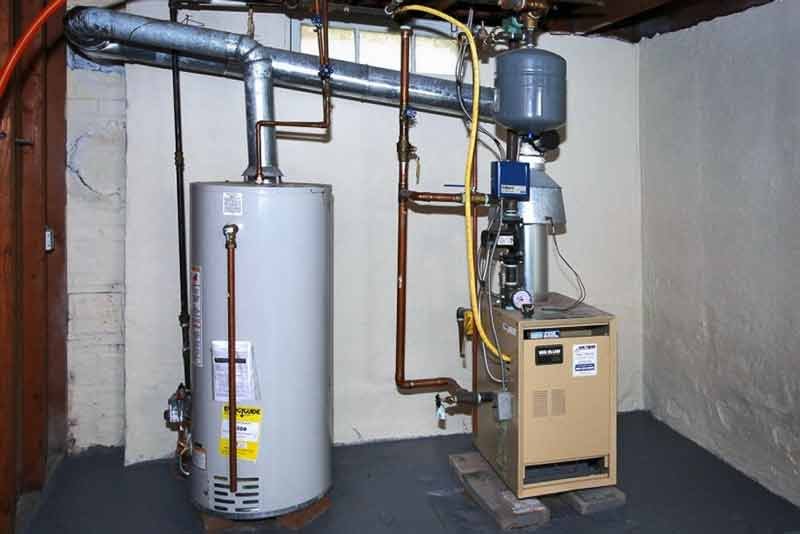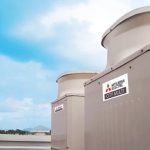Boiler vs Tankless Water Heater: Heating water is one of the most essential and energy-consuming tasks in a household. According to the U.S. Department of Energy, water heating accounts for about 18% of the total energy use in a typical home. Therefore, choosing the right system to heat your water and your house can make a big difference in your comfort, convenience, and utility bills. But how do you know which system is best for your needs? Boiler vs tankless water heater: which one should you choose?
Boilers and tankless water heaters are two systems that provide hot water and heating for your home. In this post, we’ll explain the differences, how they work, and factors to consider when comparing them.
What is boiler
A boiler utilizes natural gas, propane, oil, or electricity to heat water, circulating it through pipes to radiators, baseboards, or radiant floor systems. This transfer of heat warms the air in residential and commercial buildings. Boilers also supply hot water for domestic use, serving showers, faucets, and appliances. They operate at different pressure levels, with high-pressure boilers designed for industrial purposes, like power generation handling water above 160 PSIG. Conversely, low-pressure boilers, common in residential settings, manage water below 160 PSIG.
Constructed from steel, iron, or other metals based on quality requirements, boilers are assembled through welding or riveting, necessitating regular inspection and maintenance for safety and efficiency. Boilers are hot water sources and heating systems in residential and commercial spaces.You can also read our complete guide on Boiler Inspection Checklist: Your Key To Safety And Efficiency
Residential boilers warm water for various household tasks and heating needs, distributing heat through baseboard radiators or radiant floor systems. Unlike water heaters solely provide hot water, boilers eliminate the need for separate heating systems like furnaces. While “boiler” suggests boiling water, most residential boilers don’t heat water to its boiling point.
High-Pressure vs. Low-Pressure
Boilers are categorized into two types: high-pressure and low-pressure systems, depending on the water pressure in the system. High-pressure boilers are generally used in industrial or commercial settings and operate at pressures above 160 PSIG. On the other hand, low-pressure boilers are used for residential or light commercial applications, operating at pressures below 160 PSIG. You can read our this guide to find out Is A Boiler Part Of The Home HVAC System
Low-pressure boilers are more common and safer for home use, requiring less monitoring and maintenance. If you’re in the market for a boiler, you may come across the distinction between high-pressure and low-pressure units. However, if you’re selecting a boiler for your home, you should opt for a low-pressure unit, as it is the standard for residential heating applications.
Standard and Combination Setups
Standard boilers are designed with separate cold and hot water tanks dedicated to storing and heating water for domestic use. This traditional setup involves distinct cold and hot water units, providing a reliable and consistent supply. The cold water tank feeds into the boiler, which is heated and distributed domestically. This arrangement is well-suited for homes prioritizing a steady and ample hot water reservoir, ensuring a reliable source for daily activities.
You can also read more about How To Fix A Geothermal Heat Pump Not Blowing Hot Air
Combination boilers, commonly known as combi boilers, offer a more streamlined approach by integrating the heating and water supply functions into one unit, eliminating the need for separate tanks. Although they’re more compact and efficient, it’s essential to consider hot water demands and simultaneous usage when choosing a combi boiler. Their space-saving design makes them particularly appealing for large houses or households that value efficiency without compromising hot water availability. Additionally, combi-boilers operate on-demand, heating water precisely when needed, and they also serve the dual purpose of heating the home.
What is a tankless water heater?
A tankless water heater, also known as an on-demand water heater, is a system that heats water only when needed without using a storage tank. Unlike traditional water heaters, which store and continuously heat a large volume of water, tankless water heaters rapidly heat water on demand through a heat exchanger. The process starts when the hot water tap is turned on, signaling the heater to activate and heat the water passing through. This technology offers several advantages over conventional water heaters by saving money and energy.
What is the difference between boiler and tankless water heater
| Criteria | Boiler | Tankless Water Heater |
| Description | Heats water for space and hot water. Uses gas, oil, or electricity. | Heats water on demand without a storage tank. Efficient and compact. |
| Efficiency | Varies; standby losses due to tank. | Higher efficiency; no standby losses. |
| Cost | Higher installation and maintenance. | Lower installation and maintenance costs. |
| Lifespan | averages 10-15 years. | Longer lifespan of 15-20 years. |
| Maintenance | More maintenance; potential issues. | Less maintenance; fewer components. |
| Capacity | Holds 60-120 gallons. | On-demand: 2-5 gallons per minute. |
| Pros and Cons | Provides heating and hot water. | Efficient, cost-effective, but limited in capacity. |
Understand the boiler vs tankless water heater.
Efficiency
Efficiency measures how much energy is converted into proper heat by the system. A higher efficiency means lower energy consumption and lower utility bills. Both boilers and tankless water heaters can be efficient, depending on the unit’s type, model, and size. However, tankless water heaters generally have a higher efficiency than boilers, as they do not have standby heat losses from a tank, and they can modulate the output according to the demand.
Directly comparing the efficiency of boilers and water heaters poses challenges due to model variations. Boilers’ efficiency is generally measured in annual fuel use efficiency, reflecting how much energy directly converts into heat. In contrast, water heaters’ efficiency is gauged by their energy factor. According to the U.S. Department of Energy, tankless water heaters can outperform tank-style water heaters by 8% to 50% in energy efficiency, contingent on hot water usage.
boiler vs. tankless water heater Cost
The installation cost refers to the expenses involved in buying and setting up a heating or water heating system. The installation cost can vary depending on several factors, including the unit’s type, model, and size, the installation process’s complexity, the property’s location and condition, and the contractor’s fees. Boilers typically have a higher installation cost than tankless water heaters, requiring more equipment, piping, and venting. The average cost of replacing a residential boiler is $7,398, but the price can range from $1,200 to $16,000, depending on the factors above. On the other hand, the average cost of installing a tankless water heater can vary from $1,000 to $3,000 to $5,000.
Lifespan
The lifespan of a heating system refers to the length of time it can operate effectively and efficiently. A longer lifespan means lower replacement costs and less environmental impact. The lifespan of both boilers and tankless water heaters depends on the type, model, and quality, as well as the usage and maintenance of the system. However, tankless water heaters generally have a longer lifespan than boilers due to fewer moving parts and less corrosion. On average, a boiler lasts 10 to 15 years, while a tankless water heater lasts 15 to 20 years.
Required Maintenance
Maintenance is the work and money required to keep the system in good condition and performance. Lower maintenance means less hassle and expense for the homeowner. Both boilers and tankless water heaters require regular maintenance, such as cleaning, flushing, inspecting, and repairing the system. However, boilers generally require more maintenance than tankless water heaters, as they have more components and potential issues, such as leaks, scale, rust, and sediment. The average maintenance cost of a boiler is $150 to $500 per year while maintaining a tankless water heater can range from $50 to $1,300. On average, maintenance costs around $600.
Water capacity
Water capacity refers to the hot water a heating system can produce at a specific temperature and time. A higher water capacity implies greater comfort and convenience for the user. Depending on the unit’s type, model, and size, as well as the water flow and demand of the house, both boilers and tankless water heaters can provide enough hot water for the home.
However, tankless water heaters may have a lower water capacity than boilers due to their limited output capability, which may require assistance handling multiple or simultaneous uses. On average, a boiler can hold between 60 and 120 gallons of water, while a tankless water heater has an average water capacity of 2 to 5 gallons per minute.
Boiler pros and cons
Boilers and tankless water heaters have pros and cons, and the best choice depends on the needs and preferences of the homeowner. Here are some of the pros and cons of each system:
- Provide heating and hot water for the home
- Heat large homes and multiple zones effectively
- Provide consistent and comfortable temperatures and humidity
- Various fuels, such as natural gas, propane, oil, or electricity
- Work with multiple heating systems, such as radiators, baseboards, or radiant floor
- Higher installation cost and maintenance cost
- Lower efficiency and a shorter lifespan
- Higher environmental impact and more inadequate safety
- A larger footprint and a more complex installation
- Limited hot water supply and a higher standby heat loss
Tankless Water Heater pros and cons
- higher efficiency and a longer lifespan
- Lower installation cost and maintenance cost
- lower environmental impact and increased safety
- smaller footprint and a more straightforward installation
- unlimited hot water supply and a lower standby heat loss
- Only provide hot water for the home
- Lower water capacity and a lower water pressure
- Higher operating cost and a higher repair cost
- Higher noise level and a higher temperature fluctuation
- More extensive gas lines and a higher electrical capacity
Why do I have a boiler and Hot water tank?
While having both a boiler and a hot water tank might appear redundant, there are reasons why this setup can be advantageous:
Boiler Inefficiency: If the boiler is old and inefficient, a hot water tank might be added to supplement the hot water supply and enhance energy efficiency.
Specialized Functions: In cases where the boiler is solely used for heating and the hot water tank exclusively for domestic hot water, homeowners gain more control and flexibility over their systems.
Backup or Buffer: In scenarios where the boiler serves both heating and hot water needs, the hot water tank can function as a backup or buffer, offering increased reliability and comfort for the homeowner.
Final Thoughts
Boilers and tankless water heaters are two options for heating and hot water, but each has pros and cons. Boilers can heat large spaces and provide hot water but are expensive to install and maintain. Tankless water heaters are efficient and long-lasting but only provide hot water. When choosing, consider efficiency, cost, lifespan, and capacity, and consult a professional for safe and proper installation.
Frequently Asked Questions
Can a tankless water heater replace a boiler?
A tankless water heater can replace a boiler for hot water only, but not for heating. If you use the boiler for both purposes, you will need a separate heating system like a furnace or heat pump.
Is a water heater better than a boiler?
Water heaters and boilers both heat water to different temperatures. Boilers heat water to near-boiling temperatures, which is hot enough to warm your living quarters, but even the most scalding water from a water heater is rarely that hot.
What are the three types of water heaters?
The three main types of water heaters are:
- Tank-style water heaters
- Tankless water heaters
- Hybrid water heaters
What is the new technology for water heaters?
Some of the new technologies for water heaters are:
- Smart water heaters
- Solar water heaters
- Condensing water heaters





